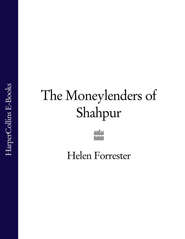скачать книгу бесплатно
‘Bahin, are you really going to be married?’
Anasuyabehn nearly choked, as sobs rose in her and were hastily crushed down.
The boy looked frightened, and she took his hand and pulled him to her. ‘I’m not sure,’ she said. ‘But you mustn’t worry. Your work will be here just the same.’
He was not satisfied; a child’s instinct to sense trouble was with him, and he feared change.
‘Can I come with you to serve in Desai Sahib’s house?’
‘I don’t know, boy. I will ask. Do you want to come?’
The boy fell to his knees and touched her feet. He would have lifted her foot and touched his head with it, but she restrained him. Such devotion from so small a person hurt her. ‘My cup is full,’ her heart cried. ‘My cup is full.’
‘There,’ she said comfortingly. ‘If the marriage is finally arranged, I’ll ask the Sahib. Go and get the clean shopping bag, to put the flour in – and remember to feel the flour as it comes out of the chute. Last time you brought back half of someone else’s rubbish which was already in the machine. The miller is a rogue.’
Her gay tone made the boy laugh. He crammed his round, black cap on to his head and was soon on his way.
Anasuyabehn sat stonily on the veranda. The first panic had ebbed from her and she felt tired and exhausted. Furthermore, she had no idea what to do. She was no fool; she knew that by worldly standards an alliance with the Desais was desirable; the difference in caste troubled her not at all – she had gone to school with many different castes – but the possible Bania orthodoxy of the Desais’ home life did. It was an orthodoxy which forbade more than a minimum of communion between husband and wife, judged success in life by the amount of money buried in the floors of the house and regarded its acquisition as a religious duty.
Then there was Tilak, whose burning, narrowed eyes sought her out from among the other women at the tea parties and badminton parties given by the University staff, so that she blushed and had to put her sari up over her head to hide her confusion.
In angry revolt against her father’s wishes, her tired mind sought frantically for a solution. She could become a nun, she considered desperately, and gain universal respect thereby – but the Jain religion offers little of true comfort for a woman.
She could run away – to what?
There is no place in India for a woman by herself, she thought bitterly, no honourable means of earning a living alone.
She remembered mournfully those brave Jains who sought release from the cycle of rebirth by starving themselves to death. She thought of her soft, round body tortured by hunger, reduced to an ugly bundle of suffering.
‘I couldn’t do it,’ she acknowledged miserably. ‘I want to live – life could be so sweet.’
She thought of Tilak and the weight of disapproval that would descend upon him, as a result of her aunt’s remark about his dissecting. What an old troublemaker she was. She wept.
As her weariness gained on her, fear receded. Eventually, half asleep, she began to dream of a real lover, someone who thought her beautiful in mind and body, someone who would give her a son like himself, tall, slender, dynamic, and a little girl to dress in frilly, Western dresses. But the fact that Desai obviously thought of her as a very desirable woman was forgotten.
Desai had stayed half an hour, listening politely to his would-be father-in-law and hoping to catch a glimpse of his betrothed. At last, reluctantly he took his leave, and it was arranged that he would call again more formally, bringing his relations with him to meet Anasuyabehn. The Dean gave no hint that his daughter might repudiate the agreement, because he heartily hoped she would not. Orthodox he was in much that concerned himself alone, but he was intelligent enough to know that his grandchildren were going to live in an entirely different world, and he felt that that world, as far as India was concerned, was going to belong to those with capital and initiative. The Desais had both. He knew that many might criticize his choice of a husband for his daughter; yet his instincts told him that he was right. Moreover, he liked Mahadev personally; the man was neither ignorant nor stupid and he heartily respected his future father-in-law’s learning.
Вы ознакомились с фрагментом книги.
Для бесплатного чтения открыта только часть текста.
Приобретайте полный текст книги у нашего партнера:
